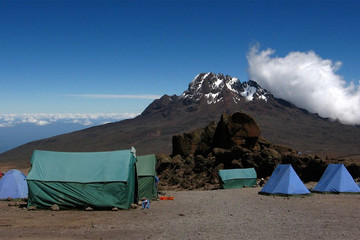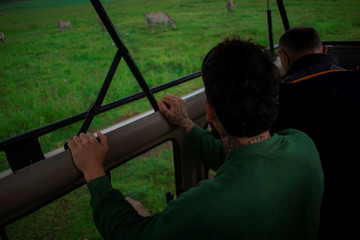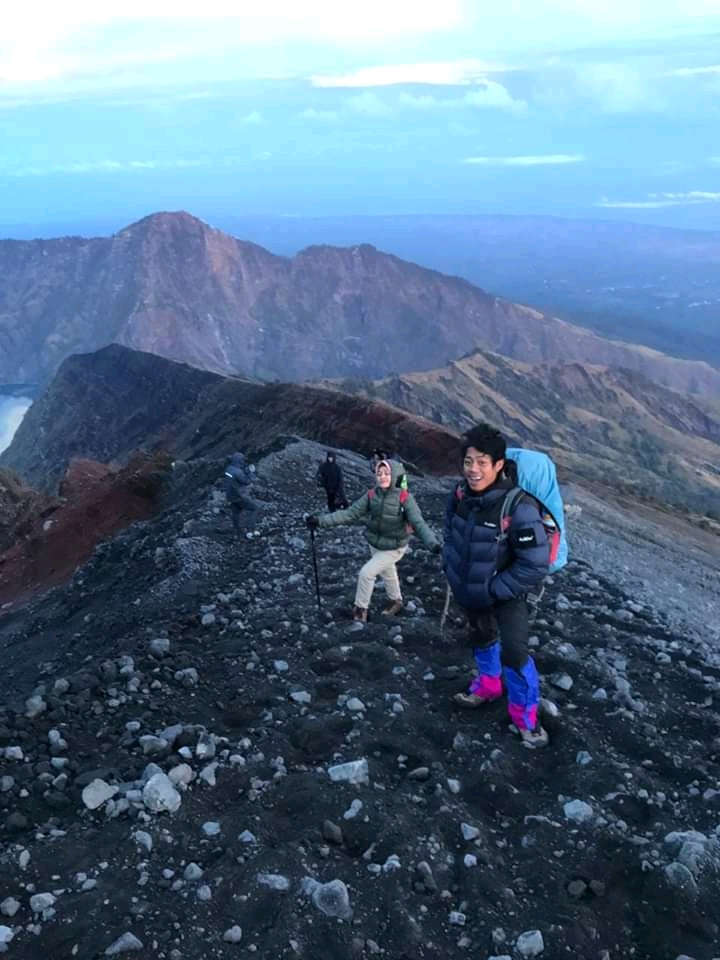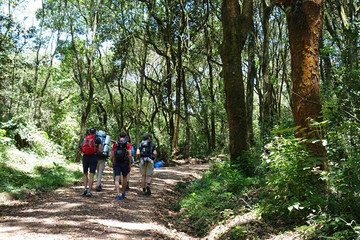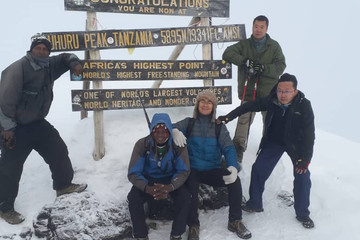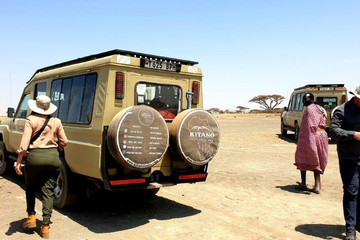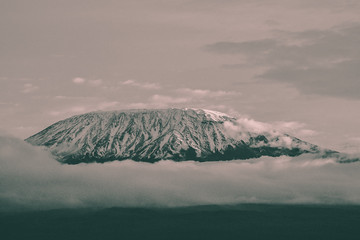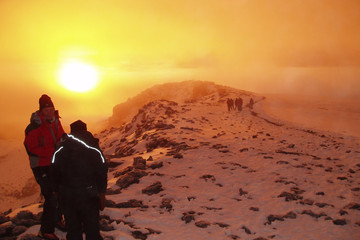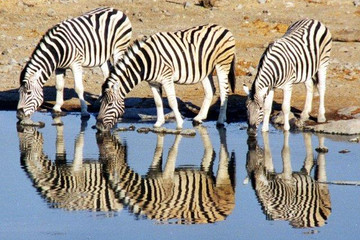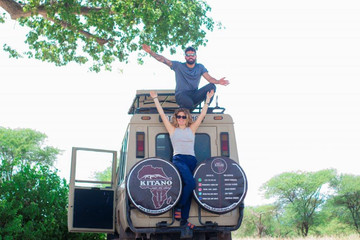10 days western breach route kilimanjaro trekking
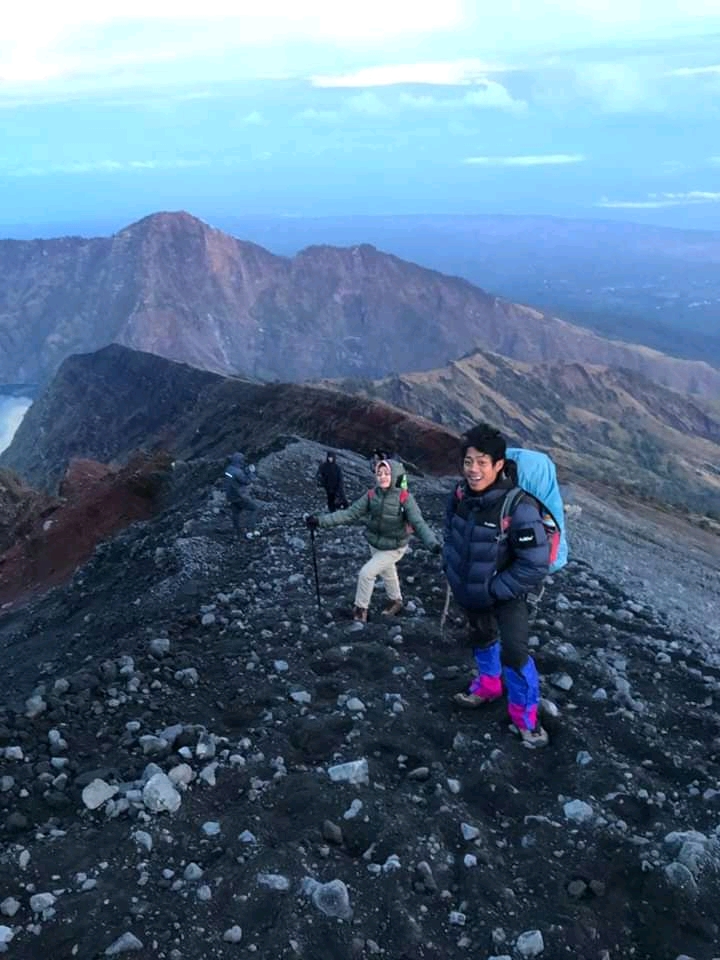
10 Days Western Breach route: (Kilimanjaro Hiking)
AFRO-VERTEX TOURS & SAFARIS
(The best tour company in Moshi, Tanzania)
Specialized in: Tanzania Wildlife safaris, Cultural tourism, Mountain climbing, Zanzibar Beach holidays and Bike Tours.
Phone/WhatsApp: +255 764 271 997
Email: mailto:[email protected]
10 DAYS WESTERN BREACH ROUTE KILIMANJARO TREKKING
If you’re excited by a challenge to your fitness and character, and you want to climb the quieter western side of Kilimanjaro, then our Western Breach route might be the climb for you. This is not an easy climb and you’ll need time to acclimatize, but the rewards are outstanding. A lonely route, a less-travelled path, more challenging scrambles, quieter camps and the boundless blue skies and golden African sunsets of the most majestic of mountains are some of the unique aspects of our Western Breach route. But this route is not for beginners. Acclimatization is doubly important as ascending the Breach is much easier than descending it – if you have altitude sickness, up is the only way forward. So, we have included an acclimatization day mid-route to give you the best chance of success. And it’s a beautiful route. You’ll climb through aromatic rainforest with its screeching birdlife and colorful flora; you’ll pass through moss-girt Montana forest onto high heath land above the tree line, and as you climb higher into alpine meadow and scrub, you’ll see glaciers glinting ahead as you scramble over pure mountain streams. The higher ridges and escarpments are arduous and you’ll feel every boulder and every outcrop in every one of your muscles. You’ll skirt through the recently-opened Western Breach, a rip in the wall of Kilimanjaro crater itself and onwards to the summit, Uhuru, the rooftop of Africa. Of course, you can trust our expert, professional guides to help and support you every step of the way and you’ll enjoy hearty meals and drinks to fuel your climb. The Western Breach Route is not an adventure just anyone can handle – if you think you’ve got the right stuff for it, then why not challenge yourself?
TOUR ITINERARY
Day 1: Kilimanjaro Airport to Moshi
We’ll pick you up from Kilimanjaro Airport and transfer you to a comfortable hotel or B&B in Moshi, which is the base town from which you’ll start your big adventure. We’ll spend some of the day checking over your kit to make sure you’ve everything you need and you’ll have the chance to get your bearings. Moshi is a bustling, lively town with colorful markets so if you’ve time take a quick look around and then rest your legs at one of the many quirky coffee bars. Don’t be too energetic – you’ll need to save your energy for the tough trek ahead!
Day 2: Moshi - Forest Camp (2821m) (via Londorossi Gate (2424m), Lemosho Route)
Walking Time: 3, 5 hours Distance: 5.4 km Altitude Gain: 397m
Our trek begins on the wilder, western side of Kilimanjaro so you’ll spend part of Day 2 admiring the patchwork fields of the coffee and banana plantations as you’re driven along the south boundary of majestic Kilimanjaro to the Londorossi Gate. After we’ve completed the park entrance formalities, you’ll be driven 12k further through Cyprus plantations into breathtaking natural wilderness, resplendent with pristine rainforest where you’ll spot colobus and blue monkeys. There’s even a chance of seeing antelope, elephant and buffalo, which prefer this quieter side of the mountain. You’ll hike through dreamy, misty moss-clad forest, through a sound’s cape of birdcalls, monkeys tripping across branches overhead, and your own footfalls. The flora can be breathtaking – the glowing orange of the Fireball lily, the pink and white impatiens, and varieties of hibiscus. You’ll camp at Forest Camp – also known as Big Tree Camp or Mti Mkubwa – among the African yellow-wood, Hypercom and hanging flowers of the hagenia. After a tasty dinner you’ll fall asleep to the sound of the night birds.
Day 3: Forest Camp (2821m) – Shira Camp 1 (3350m)
Walking Time: 5-6 hours Distance: 9 km Altitude Gain: 529m
It’s an early start today as, after a filling breakfast, you’ll leave the density and closeness of Montaigne Forest. The trees thin out as your vista opens up to big skies and high heat on your way up towards the Shira Plateau. The moorland you’ll hike through is an almost prehistoric landscape of giant heathers interspersed with groundsel and lobelia. You’ll pick your way over bubbling mountain streams, steep ridges and rocky outcrops and we’ll rest for lunch on the western edge of the Shira Plateau, where you’ll see the Kibo Massif sweeping up to the summit. It may seem so far away now but you’ll get there! After lunch we’ll continue the trek under the glorious African skies with plenty of opportunity for photography. We’ll rest overnight at Shira 1 Camp where you’ll get the chance to relax, gazing as the sun sinks into the clouds below you while you enjoy a scrumptious dinner before a well-earned rest.
Day 4: Shira Camp 1 (3350m) - Moir Camp (4,200m)
Walking Time: 5-7 hours Distance: 14km Altitude Gain: 850m
Today you’ll wake to azure blue skies – hopefully! – As you’ll seem to be floating above cloud level. After a hearty breakfast you’ll continue your adventure northwards, as the scenery becomes rockier and barren. You’re heading to the little-used and lonely Moir Camp, definitely and literally off the beaten track, so it will seem that you have the mountain to yourself. You’ll stop to rest and have lunch which will give you the opportunity to listen to the sound’s cape this side of the mountain - a still hush, or, more likely, the wind whipping round the rocks. After further climbing you’ll enjoy a well-earned rest and hearty dinner at Moir Camp.
Day 5: Moir Camp (4,200m) - Sheffield Camp (4,338m)
Walking Time: 4-5 hours Distance: 5km Altitude Gain: 138m
After a restful sleep and sustaining breakfast, you’ll head off through an obvious volcanic landscape, so rocky and barren that you’ll feel like you’re on the moon. You’ll see the black, glassy obsidian rocks and pebbles, hurled out during eruptions. All the evidence of its violent past is there for you to climb over, around and through. We’ll camp tonight at Sheffield Camp, where you’ll enjoy a warming, filling dinner and the thought of a lie in tomorrow!
Day 6: Acclimatization Day at Sheffield Camp
Although you’ve climbed high, there’s more climbing to do and it’s important that you become acclimatized to the rarer atmosphere – especially as you’ll be sleeping high in Crater Camp tomorrow night. So, you’ve the opportunity to spend the day at Sheffield Camp where you can chill out in your cozy sleeping bag, take in the enormous views, the big skies and the rolling clouds below you; make friends with the friendly chats that skip around the tents or spot a white-necked raven or the soaring elegance of a bearded vulture high above you. But to really get the measure of this amazing place, take a guided walk to one of Kilimanjaro most famous features, the 300-foot Lava Tower, a breath-taking lava plug – a geological “cork” over a volcanic vent - formed when Kilimanjaro was an active volcano. Didn’t we tell you Kilimanjaro is a volcano? Don’t worry, it’s dormant. And of course, it’s important you rest your legs and your lungs for the efforts to come. Spend the day with a well-earned break, eating, snacking, and taking photos, making videos and reading. It’s also a great opportunity to take stock of what you’ve achieved so far, and gather your strength for the climb ahead – it’s a tough one.
Day 7: Sheffield Camp (4338m) - Arrow Glacier Camp (4800m)
Walking Time: 3 hours Distance: 2km Altitude Loss: 462m
We hope you feel rested and rejuvenated after your acclimatization day at the camp, but that doesn’t mean you’ll get an easy day today! An early start and a filling breakfast then you’ll say goodbye to your home for the day. Today’s hike is tough but it makes up for that with its beauty and the opportunity to dig deep into your own character. After negotiating frozen streams you’ll be climbing up the ridgeline which has amazing views – but watch your feet as you’ll be on loose scree. You’ll be directly below the Western Breach itself, with cliffs and steep drops all around you. It’s an exhilarating landscape and you’ll start to feel that the summit is really within reach. Arrow Glacier Camp has indescribable views and is known for luminescent, astounding sunsets. Kick back, relax, and enjoy the sunset and a filling dinner because it’s early to bed as the temperature drops.
Day 8: Arrow Glacier Camp (4800m) - Crater Camp (5750m)
Walking Time: 6 - 7 hours Distance: 2km Altitude Gain: 950m
Today’s the day you face the Western Breach – the most difficult of the three summit routes. You’ll start before dawn, strengthened by breakfast, and the climb is easy at first. As the sun rises over the Breach, temperatures will rise and you’ll feel good with the sun warming your muscles. You’ll meet some challenging rocky areas where you’ll have to scramble using your hands, and you’ll be well within the snowline. There are no paths through the Western Breach as the landscape changes all the time, but your guides will select the safest routes. The views are incredible. The Great Barranco Valley spreads out before you with stunning views of the Lava Tower and you’ll be able to look back across the Shira Plateau – remember that? You’ll be invigorated by a feeling of progress which will give you wings. You’ll ascend through a breach (hence the name!) in the crater rim with magnificent views of the isolated Furtwangler Glacier, the last remnant of an ice cap that once covered the summit, and the Northern Ice field. The crater floor is soft volcanic sand, softer on your feet but tougher on your calves than the rocky outcrops before. If you’re feeling strong, our guides might lead you to the Reusch Ash Pit, a 400-foot-wide hole in the centre of the crater. You’ll know you’re near a dormant volcano by the sulphurous fumes which you can smell as you approach. Otherwise, it’s bed early at Crater Camp – the highest camp in Africa - as you’ve a big day ahead of you tomorrow; the push for the summit itself!
Day 9: Crater Camp (5750m) - Uhuru Peak (5895m) - Mweka Camp (3090m)
Walking Time: 2 hours up, 7 hours down Distance: 16km Altitude Gain: 145m Altitude Loss: 2805m
It’s a big day today - the highlight of your adventure! It’s a shorter climb than other summit routes which means you won’t have to rise at midnight to start your climb, so you’ll be well-rested. It’s the steepest route, well-marked but tough. You’ll be making some of your ascent to Uhuru Peak in darkness and silence, so after a light breakfast it’ll be single file with head torches, taking it slowly and deliberately as you push up the crater rim towards Uhuru Peak. It’s a totally different atmosphere from anything you’ve felt before and as the early dawn lightens the sky to the east imperceptibly, you’ll understand the enormity of what you’re achieving. With the pink and gold of the African sunrise lighting your way, the sky becoming bolder and bluer and you’ll take in the vastness of the views around you. At last you reach the summit of Uhuru Peak itself and you’ll rest there for a short time for photo opportunities and the awesomeness of climbing up on the rooftop of Africa itself. Say goodbye to Uhuru to continue down the trail towards Barafu and the Mweka Camp, traversing almost all the landscape zones in one day – from snowy alpine ridges through moorland and into forest. You’ll still be high and excited from your successful climb and this will get your through today’s tiring downhill trek. But a hot dinner awaits you at the Mweka Camp as you celebrate what you’ve just achieved.
Day 10: Mweka Camp (3090m) - Mweka Gate (1640m) – Moshi
Walking Time: 4 – 6 hours Distance: 10km Altitude Loss: 1450m
Your final hiking day will take you down through sultry rainforest on a 4-to-6-hour hike, so we’ll make sure you have a good breakfast to fuel the journey. After the windswept silence of the high plains and dusty crater, you’ll enjoy the rustling of the trees and the birdsong and the color of the blossoms are a contrast to the monochrome landscape of the ice fields you’ve just left. It’s a great transition from the other-worldliness of the summit and it might feel strange being back in civilization – as far as rainforest is civilization! It’s time to hold your climbing certificates proudly – and of course, there’s a T-shirt opportunity, too. We’ll drive you back to Moshi where you can unwind and treat your body to a beer and a swim before your first night in a comfortable bed in over a week.
Day 11: Moshi / Kilimanjaro Airport or continue on safari
If your flight time allows it, spend some time post-climb wandering round lively Moshi: a redolent mixture of Asian and African influences with plenty of places for a tasty lunch. If you’ve chosen to continue on a safari – well, that’s a different adventure and we’ll take care of that for you! Otherwise, it’s time to say goodbye to your life changing week as we drive you to Kilimanjaro Airport in good time for your flight home.
Included:
- Park fees, camping fees & rescue fees
- 18% VAT on tour fees & services
- Transportation to & from the mountain gate
- Professional mountain guides, cooks and porters
- 3 meals daily while on the mountain
- Filtered water throughout the trek
- Fair wages for the mountain crew as approved by the Kilimanjaro National Park Authority (KINAPA), Kilimanjaro Association of Tour Operators (KIATO)
Not Included:
- Flights
- Travel insurance
- Visa and passport fees
- Tips to mountain crew
- Items of a personal nature
- Laundry Services
- A doctor for the group
- Alcoholic beverages
More info Follow us on our Web: www.afrovertextours.com
“OUR RESPONSIBILITY TO YOUR ACHIEVEMENTS”
Details
Meeting Point
Pick up from Kilimanjaro International Airport to the hotel in Moshi or Arusha, then the Kilimanjaro climbing start the next day.
Upcoming Availibilities
Organized By
Afro-Vertex Tours & Safaris
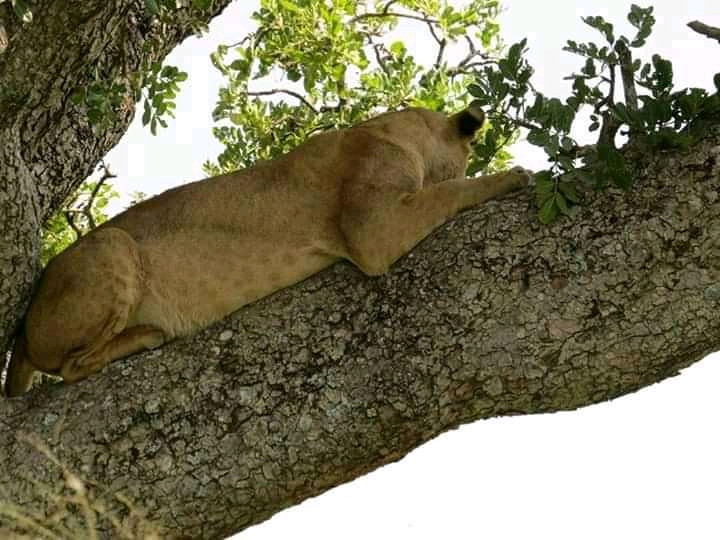
Afro-Vertex Tours & Safaris is a tour company located in Moshi at Kilimanjaro-Tanzania. Afro-Vertex Tours & Safarisis the Tanzania Tour Operating Company, registered and licensed under Government Agency for Tanzania Tour Operations.Afro-Vertex Tours & Safaris is a tour company specialized in Mountain Climbing, Tanzania wildlife Safaris, Day Trips, Cultural Tourism, Zanzibar Beach Holiday Tourism and Bike Tours through different destinations like Mount Kilimanjaro, Mount Meru, and Mountain Oldoinyo Lengai, and for Safari we offer on different destinations like Ngorongoro Conservation Area, Serengeti National Park, Tarangire National Park, Manyara National Park and Arusha National Park. With specialization in small groups and handling with related logistics planning, Afro-Vertex Tours & Safarismakes sure that the clients enjoys walking in the own chosen pace . We also make sure that you are having enjoyable time around the areas of trekking observing local culture and traditional farm life.


